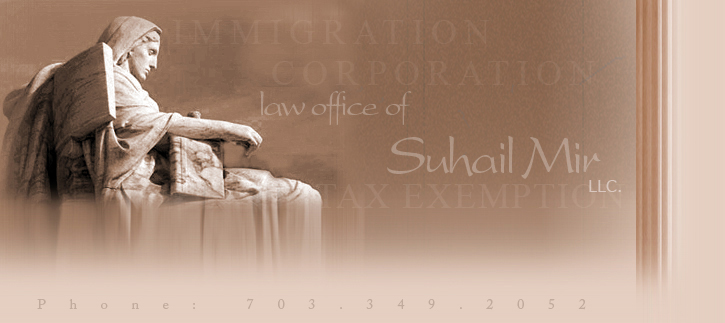
Home Attorney Profile Practice Areas Immigration Corporation Tax Exemptions Consultation Fees Resources Contact
14916 Abilene Way
Woodbrige, VA 22193
Telephone: (703) 349.2052
Fax: (703) 349.6368
suhailmir@hotmail.com
Introduction Family Immigration Immediate Relative Marriage Based Immigration Employment Visas Immigrant Non-Immigrant Student Visa Naturalization Visit Visas How We Can Help Questionnaires Family-Based Immigration:Family-Based Immigration includes immediate relatives of U.S. citizens (spouse and minor, unmarried children and parents), "preference" relatives in several categories (unmarried sons and daughters of green card holders and U.S. citizens, married sons and daughters of citizens, and brothers and sisters of U.S. citizens).
Immediate Relatives: Immediate relatives of U.S. citizens are spouses, children, and parents. There is no numerical limitation or backlog for sponsorship for immediate relatives. For parents of a U.S. citizen, the petitioning son or daughter must be at least 21 years of age.
The Family preference categories are :
1st Pref - unmarried sons and daughters (any age) of U.S. citizens,
2nd Pref - spouses and unmarried sons and daughters of lawful permanent residents,
3rd Pref - married sons and daughters of U.S. citizens,
4th Pref - brothers / sisters of U.S. citizens.Marriages within the United States: A US citizen files a petition on behalf of his/her sphouse. At the same time, the non-citizen spouse submits an application for adjustment of status and other supporting documents.
You may also apply for the work authorization and travel document while your applications are pending.
Marriages Outside the United States: If the parties are not married yet, then the foreign fiancé/e can enter the U.S. on the K-1 fiancé/e visa. She must get married to the sponsoring U.S. citizen and file the adjustment of status application package for the green card within 90 days of entry into the United States.
If the parties are married abroad, then after the marriage, the citizen spouse must submit a visa petition to either the appropriate USCIS office or directly to the U.S. embassy or consulate in the country where the non-citizen spouse lives.
The U.S. citizen spouse may enter the country on K-3 visa after his/her visa petition (I-130) is filed. This is a faster way of entering the country.
Marriage before Green Card Approval: It is important that the marriage takes place before the adjustment of status (I-485) is approved. If the primary applicant marries before I-485 is approved, the new spouse will be entitled to derivative immigration benefits. He/she is entitled to the same preference and the priority date.
Marriage after Green Card Approval: If the marriage takes place after the green card is approved, then there is a very long wait before immigration benefits can be conferred to the spouse. In this event, the new spouse is a family-based (FB) preference relative, falling within category FB 2A. The permanent resident spouse must file an I-130 petition for the foreign national spouse and wait for the priority date to become current to apply for the immigrant visa or adjustment of status.
Conditional Residence: If the marriage is less than two years old when the non-citizen spouse becomes a permanent resident, the green card will expire after a two-year period. Both spouses must submit a joint petition to remove the two-year condition within the 90-day period immediately preceding the end of the two-years.
Waiver of joint petition requirement: If the marriage has terminated by reason of divorce, death of citizen spouse, or spousal abuse, the non-citizen spouse may apply for a waiver of the joint petition requirement.
(c)2005 SM | Disclaimer | Privacy Policy | Terms of Use

Home Attorney Profile Practice Areas Immigration Corporation Tax Exemptions Consultation Fees Resources Contact
14916 Abilene Way
Woodbrige, VA 22193
Telephone: (703) 349.2052
Fax: (703) 349.6368
suhailmir@hotmail.com